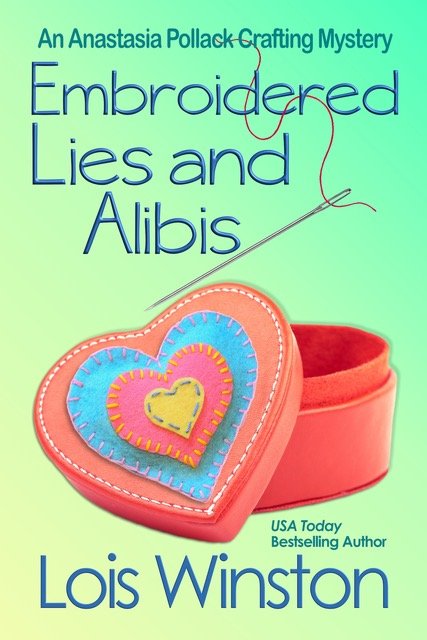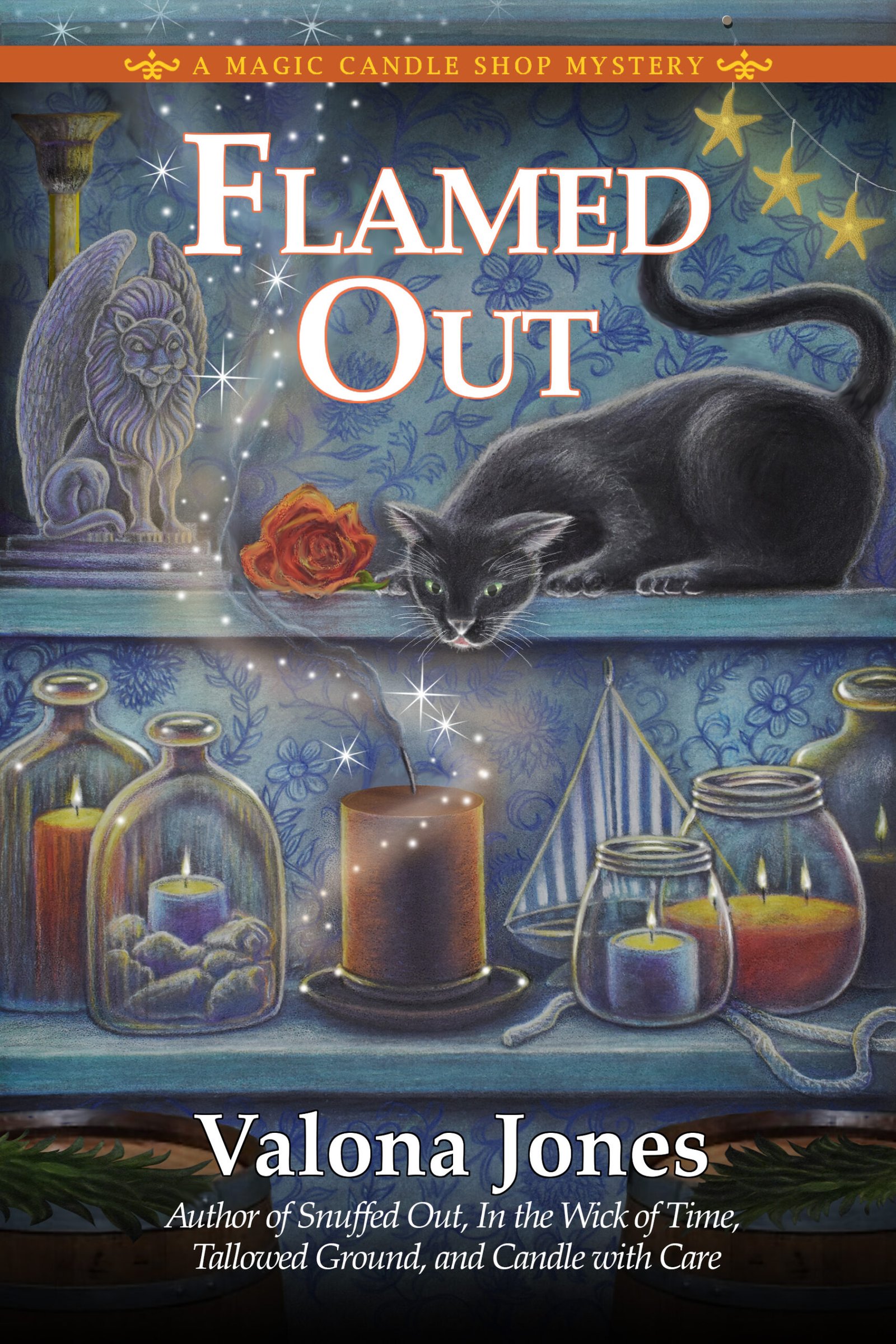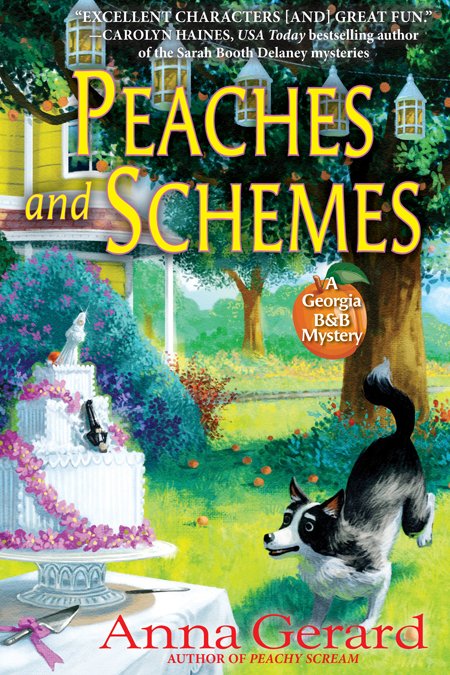Let's Talk with Lois Winston
The Good, the Bad, and the Ugly
A Pro’s Take on Publishing
 News Flash #1: Most authors are not rolling in dough. Although we occasionally plunge into a bowl of cookie dough ice cream, we aren’t cavorting in Olympic sized swimming pools filled with hundred-dollar bills. (Of course, like any rule, there are exceptions. It’s quite possible Nora Roberts, Stephen King, J.K. Rowling, and James Patterson get their kicks filling their swimming pools with Benjamins.)
News Flash #1: Most authors are not rolling in dough. Although we occasionally plunge into a bowl of cookie dough ice cream, we aren’t cavorting in Olympic sized swimming pools filled with hundred-dollar bills. (Of course, like any rule, there are exceptions. It’s quite possible Nora Roberts, Stephen King, J.K. Rowling, and James Patterson get their kicks filling their swimming pools with Benjamins.)
It seems every week another celebrity or parent, spouse, sister, brother, aunt, uncle, cousin, or next-door-neighbor of a celebrity is handed a huge chunk of change to write a book. No expertise required. All you need is celebrity status or six-degrees or less of separation from a celebrity. Fiction, nonfiction, kids’ books, cookbooks, memoirs. You name it. Whether they have any expertise on the subject or not.
Of course, most of these people really don’t write the books that bear their names. That’s what ghost writers, whether credited or not, are for. The only item that makes the news, though, is the multi-million-dollar advances handed out by the publishing industry. For that reason, much of the population think all authors are doing equally well. After all, we’ve written real books. All by ourselves. No ghost writers required.
News Flash #2: Most of us don’t even make one percent of what these celebrities make, even though celebrities rarely earn out their advances and upwards of 80% of their books wind up selling at steep discounts on bookstore remainder tables. Still, for some reason, publishers keep handing out those multi-million-dollar advances.
Another misconception is that once an author sells a book, she keeps selling books as long as she keeps writing them. The bad news for many authors is that sometimes it’s as hard or harder to sell a book once you’ve sold one.
News Flash #3: Published authors receive rejection letters all the time.
What one editor loves about a book is often another editor’s reason for rejecting it, no matter how many books the author has previously sold. So, for your enjoyment and/or morbid curiosity what follows are the good, the bad, and the downright ugly comments I’ve received from various editors on the very same book:
• Funny
• Quirkiness felt forced
• Well executed
• Range of emotion not fully expressed
• Strong beginning, likeable protagonist
• Plot is too similar to a novel we recently published (I loved this one. Aside from the initial set-up, the two books were completely different. Made me wonder if the editor bothered to read past the first chapter. He certainly didn’t bother to read the synopsis.)
• Premise is both unique and fresh.
• There weren’t quite enough sparks of wit for me.
• Witty, sparkling prose
• Not suited to our current publishing needs
• My taste, (filled) with warmth and humor
• The pacing became more and more uneven and the narrative was awkward at times.
• The author has an engaging voice.
• I didn’t fall in love with the author’s voice.
• The author has a wonderful voice.
• I didn’t love (the author’s) voice.
I’m not complaining, mind you, (okay, maybe a teeny, tiny, wee bit.) Like regular people, editors have different tastes. And, even if an editor falls in love with a book, she often can’t buy it for reasons that have nothing to do with the plot, characters, or writing.
News Flash #4: Even if she does buy the book, the chances of an author scoring a celebrity-sized advance are slim to none. Unless, of course, you’re Nora Roberts, Stephen King, J.K. Rowling, or James Patterson.
News Flash #5: No one ever said life is fair.
What turns you on or off about a book? What makes one a keeper while you toss another after a few chapters? Post a comment for a chance to win an audiobook version of your choice of the first eight Anastasia Pollack Crafting Mysteries.
Have you visited our monthly contest yet? Two books are offered this month to the winner of our contest. The entry period ends on Jan. 22. Go ahead and enter now so you don’t forget! More details at our contest page! CLICK FOR CONTEST
Want to know more about our author Lois Winston? Visit her WEBSITE.
The heart image is from Pixabay.
Posted in Let's Talk, with Lois Winston • Tags: Anastasia Pollack Crafting Mysteries, Let's Talk, Lois Winston, The Good the Bad and The Ugly | 32 Comments







This is all true. To land a book contract at all, you have to not only have written a good book but also hit the right editor at the right time at the right publishing house. As for those authors who make the big bucks, often they started out with mediocre sales until their breakout novel.
True, Nancy. And Stephen King tells a story about how he got so disheartened by all his rejection letters that he’d decided to give up. Luckily, his wife convinced him to try one more time. And the rest is history.
Sad, but True! But I Do Love Your Humor!
Thanks so much, cewxby! That means the world to me.
As a reader, I enjoy certain books at certain times in my life. I think Editors are the same. Something that grabs one’s attention doesn’t do it for another. I do agree though, those celebrity ghost-written books do rankle me. You know very few are actually writing them, but they act like they do.
Well, Sandra, most of them are actors. They know how to play a role–whether on screen or on a book tour! 😉
If I don’t like a book today, I put it down and try it again in a month. Reading is so subjective, and I have different moods demanding different mysteries.
So true, Cheryl! The first time I tried reading a certain popular series, I thought it was stupid and never finished the first book. A few years later, I tried it again, and it’s now one of my all-time favorite series. You have to be in the right mood.
I agree with Cheryl about reading being subjective. I also note that I can love a group of books by an author and then be turned off to a series or author by a few other books that I read by them that just don’t sparkle to me in the same way — maybe the series feels stale or maybe it is my mood that day.
Debra, see my comment to Cheryl. 😉
What a disappointment, really, to work so hard and be compensated so little.
So true, Tracey! Thanks for stopping by and commenting.
So many wise comments here. Your mood may affect how you react to a certain book on a particular day. One thing that turns me off is gratuitous anything. Trying to shock the reader as if that should him or her flipping pages? Me? It makes me set the book down. Author intrusion is another pet peeve of mine. If I recognize the author’s thoughts and/or words instead of the character, it weakens the story for me. We live in a deeply polarized world. An author inserting politics into a book is a real turn off for me. Readers read to escape, especially fiction.
Great post, Lois.
Donnell, Rule #1 in writing fiction: Keep your politics out of your fiction. Rule #2: Refer to Rule #1.
Very interesting. I was aware that it’s not easy to get a contract for a book or series and I admire all the steps authors have to take to get their work published. Thanks for all you do to keep your readers supplied with the books and series we love.
Thanks for stopping by and commenting, Dianne. And thanks for loving our books!
I have to admit to being a bit of a mood reader myself. A pet peeve of mine is when any kinds of political or controversial topic is placed in a book. I get enough of that in real life. I read to escape and don’t want controversial issues being put in a book. Such a turnoff.
Yes, we are bombarded daily in real life, aren’t we, Cherie? Reading is a great escape from what life throws at us.
Good post and enjoyed the comments.
Glad you enjoyed it, M.E. Thanks for stopping by and commenting.
I agree about your mood when reading. I too read a very popular author years ago and stopped after one book. I’ve gone back to her and love her series. Especially the narrator/ reader/actor she chose to record her audiobooks, that can make or break a novel.
Penny, I wonder if there are many other readers like us, people who gave up on a book, then rediscovered it years later and enjoyed. it.
This was a blast! Thank you, Lois. It’s going into my encouragement pile to re-read whenever I get a negative comment that irks me so deeply under the skin I can’t function for a while.
Pam
Website: https://pamelaruthmeyer.com
Facebook: http://www.facebook.com/pamelaruthmeyer
Instagram: http://www.instagram.com/pamelaruthmeyer
Glad you found it helpful, Pam. Thanks for stopping by!
Very nice article, Lois.
Life as an author is a constant adventure. If you don’t have patience and a good sense of humor, you are likely to be stressed all the time. I also think that you have to love it and also to keenly focus on why you want to write. I had a lot of those same kinds of rejection letters, and it was problematic to get a read on divergent opinions.
All good points, Maggie!
Some reasons for rejections are so boilerplate, they’re insulting. But the worst is never receiving a response at all. I stopped querying years ago.
I agree, Gay. Given that queries are all email now, you’d think people would have enough manners to hit reply and at least type a “thanks but no thanks.” What would that take? All of 10seconds?
Great post, Lois! It also helps to remember that a ton of editors are twenty-somethings who’ve just graduated with their coveted degree and this is their entry level job. I think that has a lot to do with the variety of comments we all get on the same book on submission. When you factor in their desire for DEI components it just starts to get crazy. Kudos to you for sharing these with us and keep on going. Your series is wonderful!
Thanks, Laurie! I’m so glad you love the series. Another factor with all those 20-something editors (who are mostly assistants) is all the mergers than have taken place in publishing. They always say nothing will change, but the first thing they do is layoff experienced editors and hire newbies to save money.
Wow! You’ve sparked a great conversation here. I agree that reading is a very personal and subjective activity, and what one reader loves another reader doesn’t. Writing to please everyone is a self-defeating principle in general, but IMHO, too much violence, sex, politics, religion can ruin a good story.
So true, Saralyn! Wasn’t it Lincoln who said you can please some of the people all the time and all the people some of the time, but you can’t please all the people all the time?